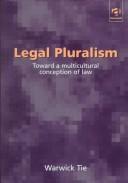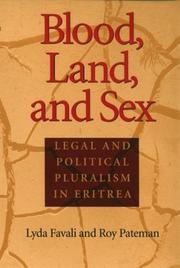| Listing 1 - 10 of 139 | << page >> |
Sort by
|
Book
ISBN: 1317095375 1472431073 9781472431073 9781472431080 1472431081 9781472431066 1472431065 9781317095378 9781315595658 9781317095361 9781138639034 1315595656 1317095383 1138639036 Year: 2015 Publisher: Farnham, Surrey, United Kingdom England ; Burlington, Vermont : Ashgate,
Abstract | Keywords | Export | Availability | Bookmark
 Loading...
Loading...Choose an application
- Reference Manager
- EndNote
- RefWorks (Direct export to RefWorks)
This book takes us far beyond the usual focus of comparative law with analysis of a broad range of jurisdictions, including mixtures of common and civil law, and also those mixing Islamic and/or traditional legal systems with those derived from common and/or civil law traditions. The discussion is situated within the broader context of the continuing tides of globalization, the emergence of Islamic governments in some parts of the Middle East, the calls for a legal status for Islamic law in some European countries, and the increasing focus on traditional and customary norms of governance in po
Legal polycentricity. --- Bijuralism --- Legal pluralism --- Pluralism, Legal --- Polycentric law --- Polycentricity, Legal --- Law --- Conflict of laws
Periodical
Abstract | Keywords | Export | Availability | Bookmark
 Loading...
Loading...Choose an application
- Reference Manager
- EndNote
- RefWorks (Direct export to RefWorks)
access to justice --- public defense --- sociology --- law --- legal pluralism --- public defensorship

ISBN: 1840147253 Year: 1999 Publisher: Aldershot Ashgate
Abstract | Keywords | Export | Availability | Bookmark
 Loading...
Loading...Choose an application
- Reference Manager
- EndNote
- RefWorks (Direct export to RefWorks)
Legal polycentricity --- Bijuralism --- Legal pluralism --- Pluralism, Legal --- Polycentric law --- Polycentricity, Legal --- Law --- Conflict of laws --- Legal polycentricity.
Book
ISBN: 1780687249 1780683677 9781780683676 Year: 2016 Publisher: Cambridge : Intersentia,
Abstract | Keywords | Export | Availability | Bookmark
 Loading...
Loading...Choose an application
- Reference Manager
- EndNote
- RefWorks (Direct export to RefWorks)
Using insights from multilevel governance and pluralism, this book provides an in-depth analysis of the development of European private law in the Dutch and German legal order. It focuses on the question whether the coexistence of national and European state and non-state actors is detrimental or beneficial for the predictability, consistency, accessibility and responsiveness of European private law. On the one hand, the discourse on multilevel governance draws attention to the possibility that problems may arise if interdependent actors do not sufficiently interact. This may be the case in European private law, where national and European legislators and courts have become increasingly interdependent on one another in ensuring that European private law develops predictably, consistently, accessibly, and responsively. The book analyzes the development of European private law by national and European state actors through codifications, blanket clauses, soft laws and general principles in the light of interdependence. In addition, non-state actors have played an increasingly important role in developing binding rules in European private law. This development necessitates more interaction between actors, and more attention for the potentially binding effect of privately developed rules on third parties' rights. The book accordingly develops a normative framework to determine the extent to which private actors should be able to develop binding rules, based on principles of democracy, private autonomy, and concerns for hetero-determination. On the other hand, pluralism perspectives advocate the development of European private law at different levels and jurisdictions in the light of responsiveness, regulatory competition, and opportunities for mutual learning. The book explores whether these benefits have materialized in the development of European private law, drawing attention to failed and successful instances of regulatory competition and mutual learning, and resulting innovations. The book sketches new governance techniques that may help interdependent actors take into account one another's initiatives and benefit from each other's insights, although they may also entail hetero-determination.
Civil law --- Legal polycentricity --- Bijuralism --- Legal pluralism --- Pluralism, Legal --- Polycentric law --- Polycentricity, Legal --- Law --- Conflict of laws
Book
ISBN: 0191773050 019100894X 0191008958 9780191008948 1306224470 9781306224475 9780198703228 0198703228 Year: 2013 Publisher: Oxford Scholarship Online
Abstract | Keywords | Export | Availability | Bookmark
 Loading...
Loading...Choose an application
- Reference Manager
- EndNote
- RefWorks (Direct export to RefWorks)
This title offers an overarching examination of constitutional pluralism in the European context. Mapping the leading work to date, it offers a critical assessment of the problems and potential of pluralist theory, arguing that a refined version of constitutional pluralism should be considered the best account of European constitutionalism.
Constitutional law --- Legal polycentricity --- Bijuralism --- Legal pluralism --- Pluralism, Legal --- Polycentric law --- Polycentricity, Legal --- Law --- Conflict of laws
Book
ISBN: 9783725562220 Year: 2010 Publisher: Zurich : Schulthess,
Abstract | Keywords | Export | Availability | Bookmark
 Loading...
Loading...Choose an application
- Reference Manager
- EndNote
- RefWorks (Direct export to RefWorks)
Comparative law --- Legal polycentricity --- Bijuralism --- Legal pluralism --- Pluralism, Legal --- Polycentric law --- Polycentricity, Legal --- Law --- Conflict of laws

ISBN: 9786612072109 1282072102 0253101182 0253109841 9780253109842 0253342058 9780253342058 0253215773 9780253215772 9780253101181 9781282072107 6612072105 Year: 2003 Publisher: Bloomington Indiana University Press
Abstract | Keywords | Export | Availability | Bookmark
 Loading...
Loading...Choose an application
- Reference Manager
- EndNote
- RefWorks (Direct export to RefWorks)
In Eritrea, state, traditional, and religious laws equally prevail, but any of these legal systems may be put into play depending upon the individual or individuals involved in a legal dispute. Because of conflicting laws, it has been difficult for Eritreans to come to a consensus on what constitutes their legal system. In Blood, Land, and Sex, Lyda Favali and Roy Pateman examine the roles of the state, ethnic groups, religious groups, and the international community in several key areas of Eritrean la
Legal polycentricity --- Bijuralism --- Legal pluralism --- Pluralism, Legal --- Polycentric law --- Polycentricity, Legal --- Law --- Conflict of laws --- Eritrea --- Politics and government.
Book
ISBN: 1317162455 1409455270 9781409455271 1138637688 1317162463 1315573296 Year: 2014 Publisher: Burlington, VT
Abstract | Keywords | Export | Availability | Bookmark
 Loading...
Loading...Choose an application
- Reference Manager
- EndNote
- RefWorks (Direct export to RefWorks)
In this study international legal experts explore legal concepts and contexts from diverse national and disciplinary perspectives. Themes range from legal and normative pluralism to the development of state law and legal systems, and from law's rhetoric and the potential utility of alternative vocabularies to the polyjurality of the present. The study combines theoretical analyses and case studies to create a rich picture of present scholarship on laws and norms and the state of contemporary legal complexity, each crossing traditional boundaries.
Legal polycentricity. --- Law --- Jurisprudence --- Bijuralism --- Legal pluralism --- Pluralism, Legal --- Polycentric law --- Polycentricity, Legal --- Conflict of laws --- Philosophy.
Book
ISBN: 1847318924 1472561120 1281064807 9786613774026 1847318916 9781847318916 9781281064806 9781849461252 1849461252 9781847318923 9781472561121 6613774022 Year: 2012 Publisher: Oxford Portland, Oregon Hart Publishing
Abstract | Keywords | Export | Availability | Bookmark
 Loading...
Loading...Choose an application
- Reference Manager
- EndNote
- RefWorks (Direct export to RefWorks)
Constitutional pluralism has become immensely popular among scholars who study European integration and issues of global governance. Some of them believe that constitutionalism, traditionally thought to be bound to a nation state, can emerge beyond state borders - most importantly in the process of European integration, but also beyond that, for example, in international regulatory regimes such as the WTO, or international systems of fundamental rights protection, such as the European Convention. At the same time, the idea of constitutional pluralism has not gone unchallenged. Some have questioned its compatibility with the very nature of law and the values which law brings to constitutionalism. The critiques have come from both sides: from those who believe in the 'traditional' European constitutionalism based on a hierarchically superior authority of the European Union as well as from scholars focusing on constitutions of particular states. The book collects contributions taking opposing perspectives on constitutional pluralism - some defending and promoting the concept of constitutional pluralism, some criticising and opposing it. While some authors can be called 'the founding fathers of constitutional pluralism', others are young academics who have recently entered the field. Together they offer fresh perspectives on both theoretical and practical aspects of constitutional pluralism, enriching our existing understanding of the concept in current scholarship
Constitutional law --- Legal polycentricity --- Bijuralism --- Legal pluralism --- Pluralism, Legal --- Polycentric law --- Polycentricity, Legal --- Law --- Conflict of laws --- E-books
Book
ISBN: 1316880044 1316880419 131688189X 1316875059 1316880788 1316879674 1107183960 1108707254 1316877450 Year: 2017 Publisher: Cambridge : Cambridge University Press,
Abstract | Keywords | Export | Availability | Bookmark
 Loading...
Loading...Choose an application
- Reference Manager
- EndNote
- RefWorks (Direct export to RefWorks)
The pluralist turn in jurisprudence has led to a search for new ways of thinking about law. The relationships between state law and other legal orders such as international, customary, transnational or indigenous law are particularly significant in this development. Collecting together new work by leading scholars in the field, this volume considers the basic questions about what would be an appropriate theoretical response to this shift: wow precisely is it to be undertaken? Is it called for by developments in legal practice or are these adequately addressed by current legal theory? What normative challenges are raised, and what fresh promises might the pluralist turn hold? What distinctive insights can it offer for theorising about law? This book presents a rich variety of resources drawn from a number of theoretical approaches and demonstrates how they might be brought together to generate an increasingly important pluralist jurisprudence.
Legal polycentricity. --- Law --- Jurisprudence. --- Jurisprudence --- Bijuralism --- Legal pluralism --- Pluralism, Legal --- Polycentric law --- Polycentricity, Legal --- Conflict of laws --- Philosophy. --- Philosophy
| Listing 1 - 10 of 139 | << page >> |
Sort by
|

 Search
Search Feedback
Feedback About UniCat
About UniCat  Help
Help News
News